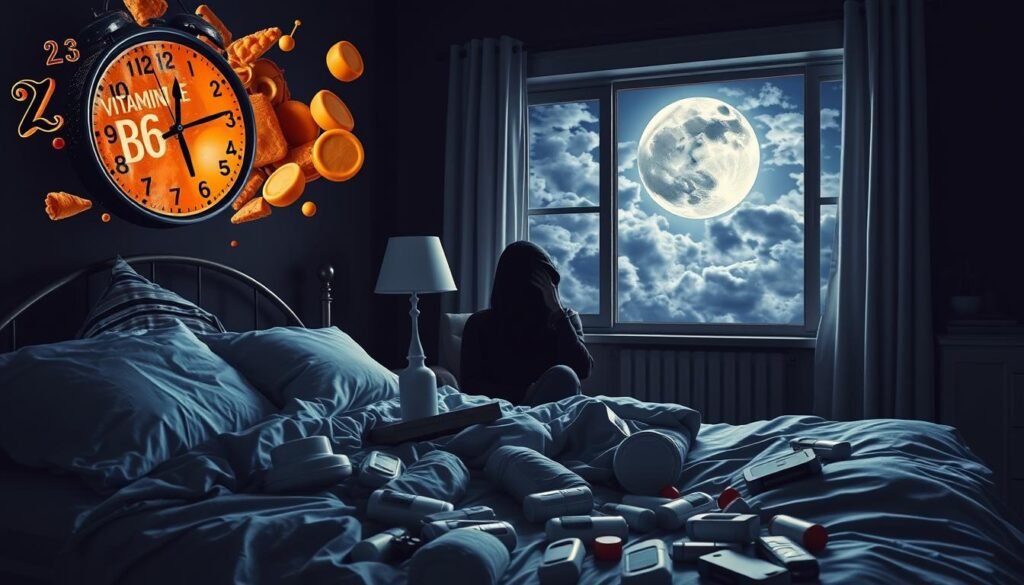Did you know over 2 million healthcare providers worldwide trust UpToDate for clinical advice? This huge number shows how much evidence-based practice matters in healthcare. It’s especially true for nutritional supplements like Vitamin B6.
Some think these supplements can boost health. Yet, the impact of high doses of Vitamin B6 on sleep is still unclear. Studies have not consistently linked vitamin intake to sleep problems. But, an interesting link exists between Vitamin B6 and how well we sleep. Taking too much Vitamin B6 could worsen sleep issues. This highlights the need to better understand how it affects us.
Key Takeaways
- High doses of Vitamin B6 have conflicting evidence regarding their effects on sleep.
- Vitamin B6 is vital for bodily functions but can lead to toxicity when consumed excessively.
- The association between nutritional supplements and sleep quality requires careful investigation.
- Healthcare professionals recommend monitoring vitamin supplementation for potential risks.
- Understanding the balance of vitamins can help mitigate sleep disturbances.
Understanding Vitamin B6: An Overview
Vitamin B6, also known as pyridoxine, is key for our body’s workings. It helps with metabolism and making neurotransmitters. This vitamin is vital for mood regulation and sleep. The recommended daily intake changes based on age and gender. It typically varies from 0.5 mg in the young to 2.0 mg in older adults.
Research shows that vitamin B6 deficiencies are common, especially in kids and seniors. Taking extra vitamin B6 can improve health by keeping homocysteine levels in check. These levels affect heart health. However, it’s important to watch out for pyridoxine side effects from too much intake.
Taking more than 100 mg of vitamin B6 daily can harm nerves. Going over 200 mg could even cause neurological issues, like losing feeling in arms and legs. So, it’s essential to control how much vitamin B6 you get, especially from supplements. Too much can be harmful.
Vitamin B6 is linked to many health benefits. It helps with morning sickness, eye aging issues, and certain mental health conditions. Yet, taking too much can lead to pyridoxine side effects. Knowing the right amount to take is key for staying safe and healthy.
| Age Group | Recommended Daily Allowance (RDA) |
|---|---|
| Adults (under 50) | 1.3 mg |
| Women over 50 | 1.5 mg |
| Men over 50 | 1.7 mg |
| Pregnant & Lactating Women | 1.9 – 2.0 mg |
High Doses of Vitamin B6 and Sleep Disturbances
Taking lots of Vitamin B6 can really affect your sleep. It’s important because it helps make serotonin, which affects our mood and sleep. Not having enough B6 can make you stressed and hurt your sleep. Yet, some people find they sleep better when they take more Vitamin B6.
Impact on Sleep Quality
Studies show that using a lot of Vitamin B6 can change how well you sleep. At the right levels, it might make you feel more rested and remember your dreams better. But too much can cause intense dreams and make sleep uneasy. We need to study more about how Vitamin B6 affects sleep deeply.
Effects on Sleep Onset and Duration
Research gives different views on using a lot of Vitamin B6 for sleep. Some findings suggest it helps you fall asleep faster. However, taking too much might make you sleep too long or mess up your sleep cycle. It’s clear we need more studies to really get how Vitamin B6 and sleep are connected.

Vitamin B6 and Its Role in the Body
Vitamin B6 is known for its many health benefits. It is key in amino acid metabolism, immune function, and making neurotransmitters. Neurotransmitters like serotonin and melatonin help regulate our sleep.

The amount of vitamin B6 people need changes with age. Men aged 14 to 50 need 1.3 mg a day, and those over 51 need 1.7 mg. Women from 14 to 18 should get 1.2 mg, those 19 to 50 need 1.3 mg, and over 51 should have 1.5 mg. Pregnant and breastfeeding women need more, 1.9 mg and 2.0 mg respectively.
Few healthy adults lack enough vitamin B6. But, issues like kidney disease can up the risk. Symptoms include anemia, skin problems, depression, confusion, and a weaker immune system. A lack of vitamin B6 can almost double the chance of depression, especially in older people.
Not getting enough sleep can make these mood issues worse. So, keeping an eye on vitamin B6 levels is key.
Too much vitamin B6 can cause problems, such as neuropathy. This can happen if someone takes more than 1000 mg a day over a long time. It is important to balance how much you take.
| Age Group | RDA (mg daily) | Tolerable Upper Intake Level (mg daily) |
|---|---|---|
| Men 14-50 years | 1.3 | 100 |
| Men 51+ years | 1.7 | 100 |
| Women 14-18 years | 1.2 | 100 |
| Women 19-50 years | 1.3 | 100 |
| Women 51+ years | 1.5 | 100 |
| Pregnancy | 1.9 | 100 |
| Lactation | 2.0 | 100 |
Eating foods high in vitamin B6 or taking supplements has many perks. Keeping levels right can help with sleep and mood. The vitamin B6 benefits are quite significant for health.
Potential Causes of Sleep Disturbances
It’s really important to understand what causes sleep problems. Things that make it hard to sleep can be complex. They include both mind and body issues. Feelings of anxiety and stress are big reasons for not sleeping well. They can make it hard to fall asleep or stay asleep. Not getting enough nutrients, like vitamin B6, also affects our sleep. This vitamin helps our brain work well and keeps us feeling good emotionally.
Psychological Distress and Insomnia
Studies show that being really stressed can lead to not sleeping well. This is because stress affects how well we sleep. When we’re stressed, we might not sleep enough. This makes us tired and can make mental health problems worse.
Other Common Insomnia Causes
There are many reasons why people have trouble sleeping. Some common causes of not sleeping well include:
- Not having a good sleep routine and looking at screens too much before bed.
- Mental health issues like depression and anxiety, which can mess up our sleep cycle.
- Using substances like alcohol and caffeine, which hurt the quality of our sleep.
- Some medicines that might make it hard to sleep as a side effect.
- Body conditions like constant pain or sleep apnea, which really affect how well we sleep.

| Insomnia Causes | Potential Impact on Sleep |
|---|---|
| Psychological Distress | Increased anxiety leads to difficulty falling asleep. |
| Poor Sleep Hygiene | Irregular sleep schedules reduce sleep quality. |
| Substance Abuse | Disruption of sleep patterns and sleep architecture. |
| Medications | Can induce drowsiness or insomnia as a side effect. |
| Physiological Conditions | Conditions like sleep apnea hinder restorative sleep. |
Knowing these causes of insomnia is key for anyone having sleep troubles. Dealing with these issues can lead to better sleep and well-being.
The Link Between Vitamin B6 Deficiency and Sleep Issues
Studies have shown a strong link between low vitamin B6 and sleep problems. Not having enough B6 can mess with the brain chemicals that help us sleep and feel happy. This can lead to trouble sleeping, feeling upset or confused, and being easily annoyed.
People who don’t get enough vitamin B6 may feel more stressed. This can make it harder for them to sleep well. Many studies support this, showing why it’s vital to eat right or take supplements to get enough B6.
Adults between 19 and 50 need 1.3 mg of vitamin B6 daily. Men over 51 need 1.7 mg, while women over 51 should get 1.5 mg. Not getting enough can cause sleep trouble and other mental health issues.
Research also finds that taking extra B6 can make sleep better, especially with magnesium and melatonin. This shows how important it is to know about B6 and sleep. It encourages people to keep their vitamin levels up through diet or supplements.
| Vitamin B6 Daily Requirements | Age Group |
|---|---|
| 1.3 mg | Adults ages 19-50 |
| 1.7 mg | Males over 51 years old |
| 1.5 mg | Females over 51 years old |
Vitamin B6 Toxicity: Recognizing the Symptoms
Vitamin B6 is key for our health but taking too much can be harmful. Knowing the symptoms of vitamin B6 toxicity is important if you’re thinking about taking supplements. Being aware of vitamin overdose symptoms can help you avoid serious issues like neuropathy from too much B6.
Understanding Vitamin Overdose Symptoms
Taking too much vitamin B6 can cause health problems. Common vitamin overdose symptoms include:
- Nerve damage
- Loss of sensation
- Coordination difficulties
- Fatigue
- Headaches
Knowing these symptoms is crucial as they can worsen over time with high doses. In the U.S., 100 mg/day is the max safe limit for adults. But in Europe, it’s only 12 mg/day.
Neuropathy from B6 Overuse
Too much vitamin B6 over time can cause neuropathy from B6, affecting your nerves. Some people have symptoms even when they don’t realize their B6 levels are high. Side effects can start with doses as low as 24 mg/day. It’s important to be careful with how much you take.
Understanding how much vitamin B6 to take can lower the risk of toxicity. When you take more than recommended, especially over 2 g/day, serious health problems can happen.
| Symptoms of Vitamin B6 Toxicity | Description |
|---|---|
| Nerve Damage | Impairment of nerve function leading to various neurological complications. |
| Loss of Sensation | Decreased ability to feel touch, pain, or temperature changes. |
| Coordination Difficulties | Struggles with maintaining balance and physical movements. |
| Fatigue | Persistent tiredness affecting daily activities and energy levels. |
| Headaches | Frequent or severe headaches potentially related to overstimulation of the nervous system. |
Alternative Treatments for Sleep Disturbances
Many folks look for different ways to fix their sleep problems. They want to sleep better without only using pills. Things like changing habits and trying herbs have helped people sleep better.
Complementary Approaches
Natural supplements are a big help for those with insomnia. Melatonin is one option that’s becoming quite popular. Research shows taking 3–10 mg can make sleep better and help you fall asleep faster.
Valerian root is another choice, with doses from 300–600 mg showing good results for some people. Then there’s magnesium, which helps people fall asleep quicker, especially older folks. Lavender aromatherapy is another gentle way to improve sleep.
Effectiveness of Combining Melatonin and Vitamin B6
Mixing melatonin with vitamin B6 is an interesting idea for sleep troubles. This combo seems to make sleep quality better. Vitamin B6 helps with dream recall and may even lessen depression signs.
With a lot of Americans trying melatonin for sleep, its popularity is clear. Adding vitamin B6 to melatonin might be a smart move for better sleep. For more tactics on beating insomnia, you might want to look at this source.
Recommendations for Safe Vitamin B6 Supplementation
When you think about adding vitamin B6 to your diet, it’s important to be safe. Adults should not take more than 100 milligrams a day. Taking too much can cause nerve problems, trouble walking, and nausea.
If you’re feeling irritable, sad, or getting sick often, you might not have enough vitamin B6. Talk to a doctor if you notice these issues. They can tell you if you need more vitamin B6.
Be careful with any supplements, especially if you have health issues or take medicine. Always get advice from a healthcare expert before starting on vitamin B6. This helps you stay safe and make sure the supplement works for you.
Studies show that high doses of vitamin B6 may help with anxiety in some people. But the risk of taking too much is why it’s key to not go overboard. Always make choices based on good information.
Eating foods high in vitamin B6 is also a smart move. You can find it in fish, tofu, dairy, eggs, bananas, and green veggies. This way, you can get the vitamin you need without the risks supplements can bring.
| Age Group | Recommended Daily Intake | Upper Limit |
|---|---|---|
| Children (1-3 years) | 0.5 mg | N/A |
| Children (4-8 years) | 0.6 mg | N/A |
| Teens (14-18 years) | 1.2 mg | N/A |
| Adults | 1.3-2.0 mg | 100 mg |
| Pregnant Women | 1.9 mg | N/A |
| Lactating Women | 2.0 mg | N/A |
Knowing how to take vitamin B6 safely and understanding the risks can help you stay healthy. If in doubt, talking to a healthcare pro can guide you the best. For more on vitamins, check out this resource on magnesium and sleep.
Conclusion
The relationship between Vitamin B6 and sleep is complex and meaningful. Studies show that Vitamin B6 can improve sleep by reducing anxiety. It can also help with brain functions related to seeing. This may improve mood and thinking skills.
It’s important to be careful with Vitamin B6 intake though. Too much can be harmful. Balancing supplements with food sources is key to avoid harm. As we learn more about Vitamin B6 and sleep, understanding nutritional needs is essential for good sleep.
More research encourages us to look after our mental and physical health. Vitamin B6 might help people with anxiety and trouble sleeping. To learn about magnesium and Vitamin B6’s effects on conditions like Restless Legs Syndrome, check out the findings here.